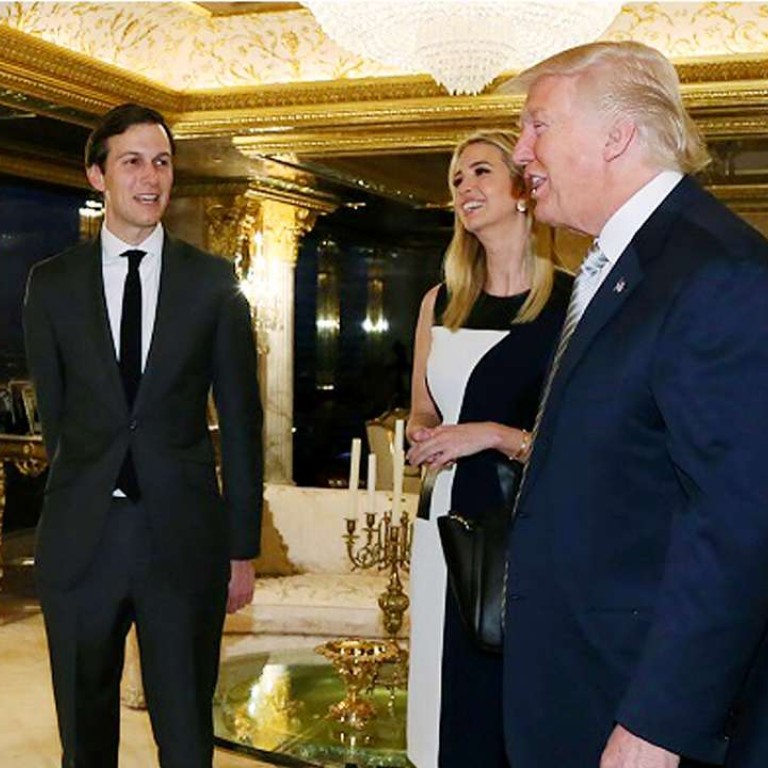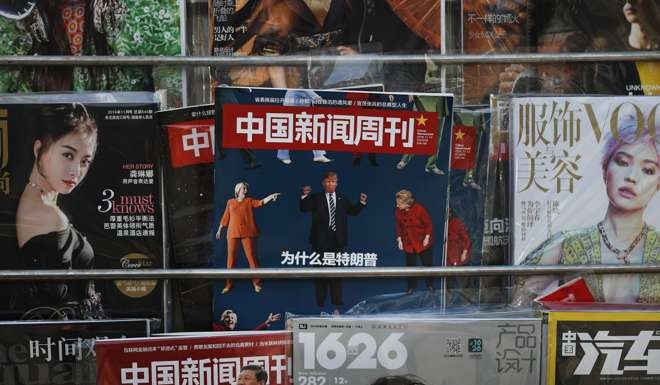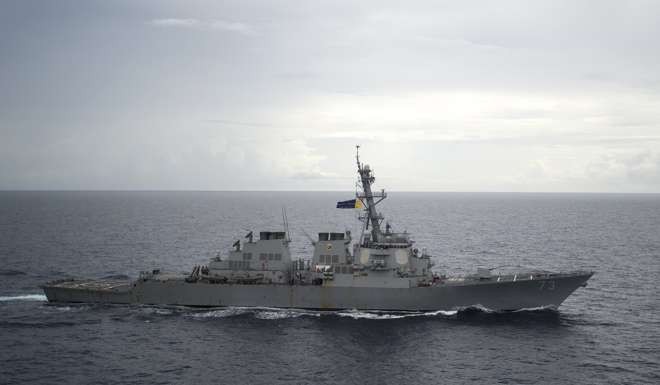
What will Trump presidency mean for Asia and China’s regional role?
Analysts describe next US leader as an impulsive foreign affairs amateur and an ‘unknown unknown’
Pivot or not, the future of the US policy of engagement with Asia is likely to be a defining feature of a Donald Trump presidency, especially after the US president-elect released a video on Monday in which he pledged to withdraw from a major regional trade accord on his first day in office.
Turning the worst nightmare of America’s regional allies into reality, the 70-year-old real estate mogul’s surprise election victory threatens to dismantle US President Barack Obama’s Asia policy legacy and put decades-old US alliances in the region in doubt.
WATCH: US president-elect Trump announces he will cancel the TPP agreement
We’ll have to wait and see if both sides can develop some new common grounds to replace the old ones that may soon vanish
Some diplomatic pundits even say an isolationist foreign policy under Trump, known for his showman style and brash and blunt personality, might become a turning point for America’s leadership of a chaotic world – with an increasingly assertive China in mind as a successor.
Although America’s president-elect has yet to unveil his foreign policy line-up or release any policy road map, observers warn that Asian nations should expect a bumpy ride ahead, with post-election chaos and uncertainty likely to reign in Washington in the coming weeks, if not months.

During his campaign, Trump frequently criticised Obama’s Asia policy, mused about the possibility of abandoning America’s long-standing promise to defend key regional allies such as Japan and South Korea, and challenged various “job-killing” multilateral and bilateral free-trade deals, including the 12-nation Trans-Pacific Partnership (TPP) that the US signed early this year but has yet to ratify.
In Monday’s video, Trump described the TPP as a “potential disaster for our country” and said he would instead negotiate bilateral trade deals that would “bring jobs and industry back onto American shores”.
Since his stunning, upset victory over former secretary of state Hillary Clinton, who laid out the Obama administration’s “pivot to Asia” policy in 2011, Trump has sought to reassure both Tokyo and Seoul that the US would maintain a strong defensive posture in the Asia-Pacific region to protect its security and trade allies.
But pending the roll-out of a concrete and coherent Asia policy, observers say such reassurances are far from enough to remove mounting doubts about America’s regional reliability under Trump amid intensifying US-China rivalry.
In his post-election diplomatic debut, Trump met Japanese Prime Minister Shinzo Abe at Trump Tower in Manhattan on Thursday. Abe described the hour-long meeting with the president-elect as “candid”, which in the lexicon of diplomatese usually means heated discussion with few concrete results.
At a news conference in Buenos Aires, Argentina, on Monday, Abe said the TPP would be “meaningless” without the US and could not be renegotiated.

Observers also note that Trump has stopped short of clarifying his stance on the fate of the Asian pivot itself – later rebranded a rebalance – which has kept everyone guessing about how important Asia is to the incoming president.
“It’s going to be a bit of a mess as far as Trump’s Asia policies are concerned,” said Robert Sutter, a professor at George Washington University in the US capital. “Trump would probably even abandon the pivot policy as he sees it as a failed policy. It’s Obama’s signature Asian policy. Trump does not have an Asian policy yet.”
But Trump’s advisers insist he will not pull some 78,500 US troops out of Japan and South Korea or cede American military dominance in the Asia-Pacific region to China.
In an article published in Foreign Policy magazine on the eve of the US presidential election, Peter Navarro, a professor of economics at the University of California, Irvine, and Trump defence policy adviser Alexander Gray offered some rare glimpses into the president-elect’s Asia policy thinking.
They acknowledged the pivot was “an appropriate and timely response” to China’s growing military and diplomatic clout, but nonetheless criticised the Obama administration for “talking loudly but carrying a small stick”.
Instead of a much-rumoured American retreat from the region, they said Trump would double down on Washington’s commitment to rebuilding the US military, including adding some 80 warships to the US Navy to counter China’s rapidly expanding military capabilities, and urging Japan and South Korea to share the cost of sustaining a US presence in the region.

“Trump will never again sacrifice the US economy on the altar of foreign policy by entering into bad trade deals,” they said.
They suggested that the new president would follow Ronald Reagan’s hawkish foreign policy doctrine of peace through strength, which has been endorsed by every Republican presidential nominee since the 1980s.
Considering the likelihood of Navarro joining Trump’s administration, Steve Tsang, a senior fellow at the China Policy Institute at the University of Nottingham in Britain, said the article should be taken seriously.
Despite his often self-contradictory campaign rhetoric, Tsang said Trump was more likely to stay the course than reverse it.
“Trump does not have a clear policy on Asia or on the pivot,” he said. “His foreign policy team is not yet in place and it will take time for it to be put in place. Without a network to draw on he will have to reach out beyond the usual Trump core supporters. Their advice is likely to be in line with long-standing US national interests.”
While restoring US military prowess, and in particular its naval capabilities, would make him more able to implement an Asia rebalance, Tsang said it remained to be seen how Trump would work with long-standing US allies in the region to get them to share more of the burden.
However, observers warn, such a foreign policy approach would risk intensifying the arms race in the region and escalating tensions with China over maritime disputes.

Pang Zhongying, an international affairs expert at Renmin University in Beijing, also questioned the feasibility of Trump’s upgraded version of a pivot to Asia.
“As much as 60 per cent of US Navy ships have been deployed in the Asia-Pacific, I simply don’t see how it could be possible for Trump to further strengthen its presence in the region without creating a strategic vacuum in other geopolitically important regions and further annoying its allies in the Middle East and Europe,” Pang said.
Wang Wenfeng, deputy director of American studies at the China Institute of Contemporary International Relations, said that unlike defeated Democratic presidential nominee Clinton and his predecessors as president, personal factors about Trump, such as his unpredictability, temperament and relations with his advisers may hold the key to his success in the White House.
“The learning curve for Trump on how to become a president and how to deal with China will be much longer than previous presidents, which may not be good news for Beijing,” he said.
“Trump is known for his impulsiveness and he is a total amateur on foreign affairs, which makes it more interesting to see if he’s willing to listen to his advisers or he’d rather be the boss calling the shots.”
Stapleton Roy, a former US ambassador to Beijing, also noted that most of the experienced foreign policy people in previous Republican administrations, such as former World Bank president Robert Zoellick, former deputy secretary of state Richard Armitage, and former deputy secretary of defence Paul Wolfowitz, had said they would not support Trump.

Instead of tapping well-regarded foreign policy veterans, it has been reported that Trump is considering some controversial and less experienced loyalists, such as former New York mayor Rudy Giuliani and John Bolton, who briefly served as the US ambassador to the United Nations in 2005, to lead the State Department.
“So who would be his secretary of state? Would the secretary of state have any influence with him? Because he has had a bad record of taking advice from his advisers, with Trump we don’t know what would happen,” Roy said.
During the campaign, Trump talked a lot about slapping a big tariff on America’s imports from China, but he also talked about the need to get along with China and Russia.
“He has no experience in this area and we haven’t seen him handle these issues before,” Roy said. “It’s not at all clear who his advisers will be in these areas. So he’s an unknown unknown. That’s why you can’t really predict what the US approach to China would be.”
While Asia-Pacific nations have generally welcomed the renewed US diplomatic and military activism in the region, critics have said the new Asian orientation has often been marred by Obama’s perceived weakness in defending America’s role as regional security guarantor in the face of growing challenges from China and the nuclear-armed North Korean regime.
China experts in the US also say the lack of a significant, effective economic component in the pivot policy had undermined its effectiveness in countering China’s expansion of its influence through military muscle-flexing and chequebook diplomacy.
With Trump’s pledge to torpedo the TPP, the only real economic component in the entire pivot strategy, on day one of his administration, the pivot policy itself would need to be rebalanced.

“The pivot was always unbalanced in a way towards the military rather than the economic and cultural,” said David Lampton, a China expert at Johns Hopkins’ school of advanced international studies. “I agree with the idea we should get more involved, but it’s unbalanced.”
Roy also noted that most countries wanted to take advantage of China’s economic strength, making any efforts to contain it almost impossible.
“Containment strategy does not work because countries around China, including US friends and allies, won’t support the containment strategy,” he said. “They want to work with China.”
Analysts said Trump and his advisers appeared to have pinned their hopes on an upgraded military pivot to Asia but had failed to spell out what trade element, deemed essential for a successful rebalance policy, would be added to US Asia policy following the dumping of the TPP.
“Asian countries would need an economic dimension and they don’t want an upgrade in the security relations with the US alone,” Sutter said.
Former assistant secretary of state Kurt Campbell, a main architect of the pivot policy who has said the history of the 21st century will be written in Asia, said last month that “expectations have risen exponentially” as a result of America’s renewed activism in Asia.
“I’m afraid that the US doesn’t fully understand what it’s going to take to be really effective in Asia going forward,” he said. “And we’re going to need a much more integrated, much more cohesive, much more determined set of efforts.”
Bonnie Glaser, from the Centre for Strategic and International Studies in Washington, said regional anxieties were rising due to uncertainty about America’s transition to the new president and widespread concerns about China’s behaviour and intentions.

“China is trying to spin a narrative about how the US is not going to remain committed to the region and so the countries had better have better relations with China,” she said. “I think the anxiety will calm down, but people will continue to be concerned about the US staying power in the region.”
Glaser said Asia-Pacific nations, and especially US allies in the region, were particularly disheartened by talk of a possible special relationship between the world’s two biggest economies — the US and China – also known as the Group of Two.
“Nobody in the region wants a US-China relationship that is too intense, too engaged in strategic competition,” she said. “Nobody wants a US-China relationship that is too close and cooperative ... because they think it will happen at their expense.”
Experts said neighbouring nations’ discomfort with Beijing’s increasing assertiveness was the single biggest factor behind the spiralling tensions in the Asia-Pacific region.
Richard Bush, a China expert at the Brookings Institution, said that while the US pivot was the application of a very old policy in a new situation, the way China projected its power created doubts over Beijing’s peaceful intentions.
Although it was true that the US sometimes failed to meet its allies’ expectations to demonstrate its firmness,“I would say the US political position in East Asia today is better than it was five years ago because of China’s behaviour,” he said.
Elizabeth Economy, director of Asian studies at the Council on Foreign Relations in New York, said: “Over the past several years, there’s a heightened sense of nationalism and growing sensitivity accompanied with the belief that somehow China should have a larger say in the region because it is a larger country.”

Many experts say the watershed moment occurred during a regional meeting in Hanoi between China and its Southeast Asian neighbours in July 2010, months before the announcement of the pivot initiative. Pointing at his Singaporean counterpart, then foreign minister Yang Jiechi reportedly said: “China is a big country and you’re a small country.”
“That kind of diplomacy was a problem and not particularly helpful to resolving any sort of diplomatic challenge,” Economy said. “It’s really not helpful to China’s image. I found it really out of step with Chinese best diplomatic practices.”
Roy said that although the way China projected its power was the main source of concerns among Southeast Asian nations and Japan, the Obama administration’s failure to demonstrate US firmness had made things worse.
“The way the power has been exercised in specific situations created doubts over China’s peaceful intentions,” he said.
Both Roy and Lampton noted that under Xi Jinping, China had stopped following Deng Xiaoping’s foreign policy doctrine of hiding its capabilities and biding its time.
“Although people like former state councillor Dai Bingguo insist China has never rejected Deng’s doctrine, they just don’t talk about it any more. But it amounts to the same thing,” Roy said.
“This is one of the foreign policy problems that Xi’s government is running into, that if China throws its weight around, then it creates difficulties with its neighbours. That plays into US hands and creates frictions with key countries that are important to China.”

Lampton said: “Sometimes China sees everything everybody does, but has no perception of how people look at what China does. I think it’s time to see a kinder and gentler China, which is consistent with China’s interest.”
China needed to improve its relations with neighbours such as the Philippines, Japan, Vietnam and Indonesia, he said.
“Then these countries would not keep coming to us asking for protection,” he said. “So one reason I’d like to see China improve its relations with its neighbours is it will help us rebalance the rebalance policy in a more constructive direction.”
Analysts said the Trump factor might create a lot of uncertainty for Washington’s relations with world powers, including China.
The sweeping transition and power shift currently under way in Washington, with more than 4,000 top jobs in the administration reportedly up for grabs, including key cabinet positions and the heads of US diplomatic missions around the globe, will also have an international impact.
Pang warned it would be naive for Beijing to expect some grand bargains with Trump, considering the political background of many of his top advisers.
“It seems he’s been surrounded by a bunch of neoconservatives and Republican veterans, such as Bolton and former House speaker Newt Gingrich, who are known for their hawkish views on China and multilateralism,” he said. “They apparently have little interest in the kind of multilateral global governance that Xi has envisioned.

“We’ll have to wait and see if both sides can develop some new common grounds to replace the old ones that may soon vanish once the new administration takes office.”
Lampton said that although the US and China had worked hard to improve military dialogue, overall strategic trust seemed to be deteriorating.
“Frankly when our militaries plan a war with another power, they’re essentially planning for a war with each other,” he said. “It’s just planning. I don’t think we are going to have one ... but for purposes of planning, we each assume the other could be our adversary.
“I hope not, but I fear that relations between China and the US are heading into more troubled waters.”
Wang said that while long-term Sino-US relations might not be affected, bilateral ties would be in for a bumpier ride as both sides would need to make some adjustments in order to redefine bilateral ties under a Trump presidency.
“But compared to Clinton, Trump may offer greater challenges and opportunities at the same time,” he said. “There are simply too many uncertainties and no one knows what will happen next.”
While Xi’s nationalism, assertiveness and strident rhetoric could be very challenging for the US, Economy said she believed his ambition could be beneficial at the same time.
“So clearly there are elements of rivalry, challenges, we have different political systems and political values that are really the opposite,” she said. “By the same token, it doesn’t mean when the world is faced with very pressing problem that we cannot find ways to work together.”

